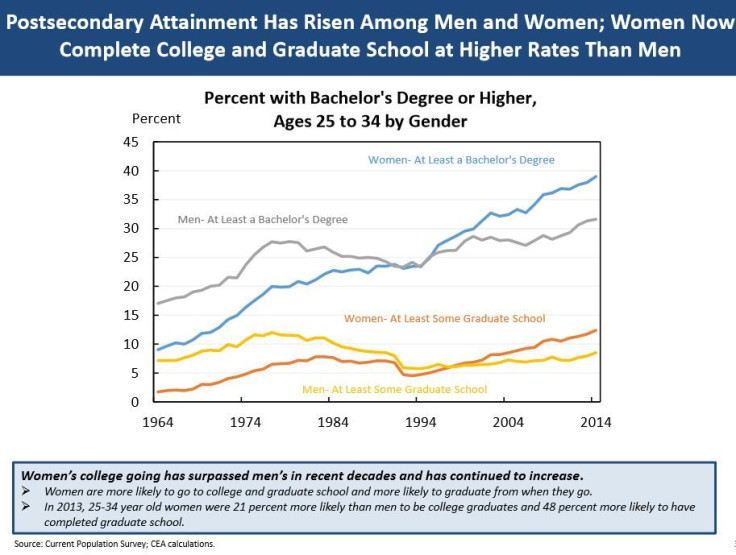Leadership Qualities Of Women Seen As Equal To Men, Survey Says; Women Also Perceived As Improving Workplace

A new Women and Leadership survey from Pew Research Center says most Americans “find women indistinguishable from men on key leadership traits such as intelligence and capacity for innovation, with many saying they’re stronger than men in terms of being compassionate and organized leaders.” Seemingly, among the ways in which the sexes differ (at least in terms of perception) some may be beneficial to your own personal health. Commonly, women in leadership and management roles show greater concern for subordinates and other employees.
For instance, past studies, including this one, suggest that women in management positions may be more effective, while exerting "transformational" effects on the workplace as a whole. According to the newest Pew survey, most people believe women more than men provide fair pay and benefits, while also offering mentorship to young employees. Generally, studies suggest women are veiwed to be more ethical than men, who nevertheless have an edge in most people's eyes when it comes to risk-taking and negotiating profitable deals.
Going forward, the future looks brighter than in the past for aspiring women. Though just over half of Americans believe men will continue to hold more top executive positions in business, a solid 44 percent of people surveyed by Pew say it is only a matter of time before as many women as men hold top executive positions. Importantly, nearly three quarters of respondents expect to see a female president in their lifetime.
Undoubtedly, these new numbers in support of women leaders show the influence of Millennials; their numbers are growing and soon they will equal the Baby Boomers as a population force. Yet, some would argue Millennials, particularly the women, could be more daring in their vision of the future.
Millennial Women
What exactly will the future selfies of Millennial women look like? Combine recent data from a number of surveys and the snapshot comes into sharp focus. According to the White House Council of Economic Advisers, in 2013, women between the ages of 25 and 34 were 21 percent more likely than men to be college graduates and 48 percent more likely to have completed graduate school. These numbers support a common representations of the current generation of young adult women as wanting to climb all the way to the top.

One predominant generational attitude about how women might best succeed in business, though, suggests this youngest adult generation might continue a trend established by earlier generations — and that might not be a good thing. Population data indicate about one in five women currently ends her childbearing years without bearing a child, compared to one in 10 during the 1970s.
Pair these statistics with the Pew research finding that about 46 percent of those born after 1980 say a woman who wants to reach a top position in business is better off waiting to have children until she is established in her career, while 25 percent say she might want to consider not having children at all. Yet, if there's anything past generations learned it's that many women who delay childbirth experience difficulties conceiving, even when using all the bells and whistles of reproductive technologies. Certainly, natural conception becomes more difficult as a woman ages.
"In 2002, among women ages 40 to 44, six percent were deemed voluntarily childless, six percent involuntarily childless and two percent childless but hoping to have children in the future," a past study of the matter states. The same number of women were involuntarily childfree as those who consciously chose to be so.
Today, Pew's Women and Leadership survey notes, women represent 19 percent of Congress, and only five percent of Fortune 500 company CEOs. Twenty years ago, they represented about 10 percent and 0 percent, respectively, of those same positions. Though slow, progress has been made. With the majority of Americans truly believing in the potential of women, maybe it's time individuals courageously begin to exclude fear of career failure from their family planning decisions.



























